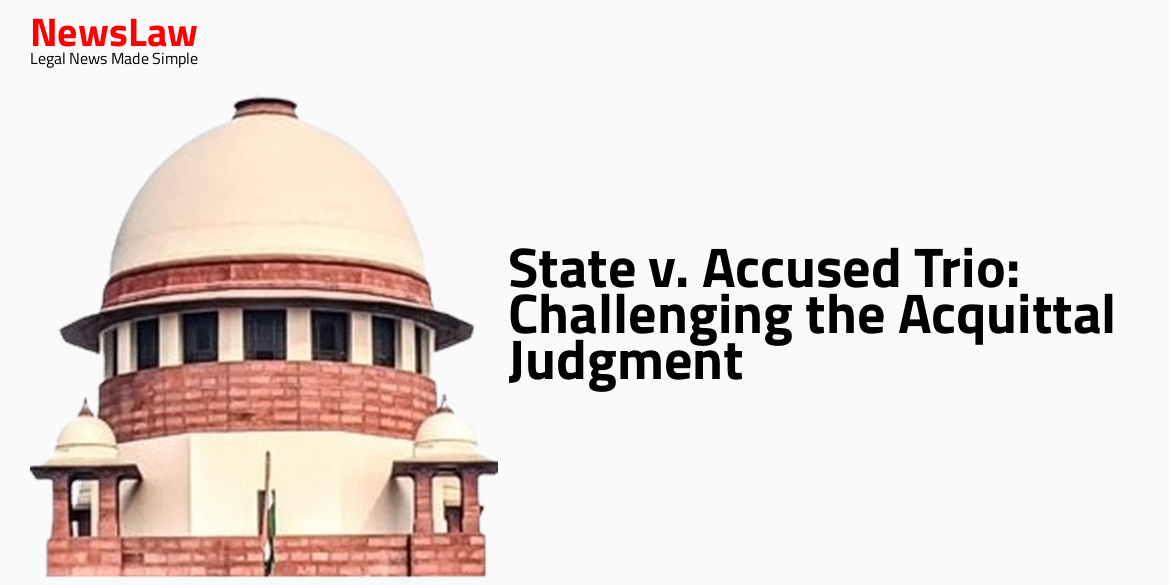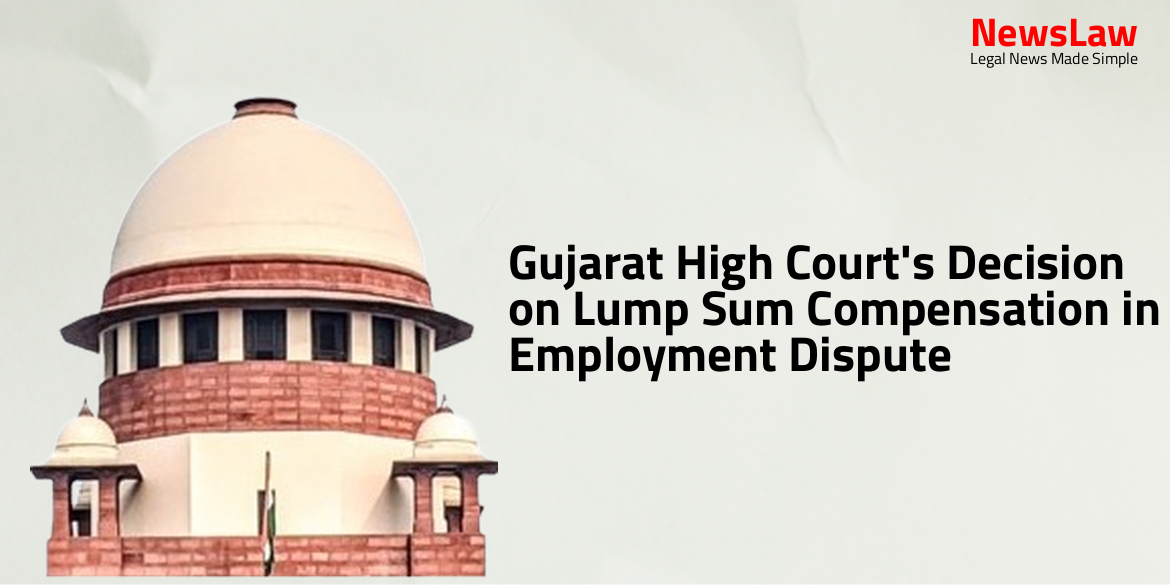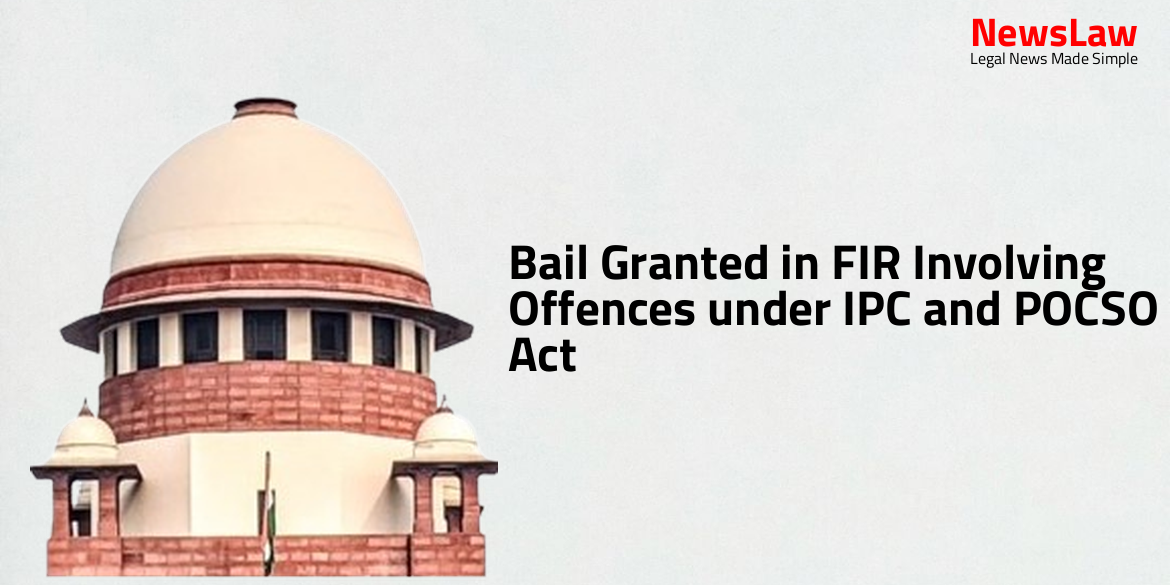In a significant legal development, the State is challenging the acquittal judgment in the case of State v. Accused Trio before the Gujarat High Court. The State appeals against the acquittal of the accused trio under Sections 302, 504 read with Section 34 of the IPC. Stay tuned for more insights on this appeal and its implications. #GujaratHighCourt #LegalCase #AcquittalAppeal
Facts
- State appeals against the acquittal of accused no.1 and 2 under Sections 302, 504 read with Section 34 of the IPC.
- Accused no.1 and 2 were acquitted due to lack of reliable evidence from sole eyewitness PW-1 Sureshbhai.
- Judgment of acquittal by the Additional Sessions Judge, Anand, on 27.07.1999 is challenged by the State.
- Accused no.3 Revaben was acquitted under Section 100 IPC for acting in private defense by inflicting stick blows.
- The incident occurred on 28.08.1990 when the deceased Vitthalbhai was attacked near the accused Bhikhabhai Punjabhai Solanki’s house.
- The accused Mafatbhai Bhikhabhai assaulted the deceased with a stick, leading to fatal injuries.
- The PSI Mr. Bhatt arrested the accused, seized the weapon, and collected necessary samples for investigation.
- Material witnesses, including PW-1 to PW-14, were examined before the trial court.
- Accused no.3 Revaben had lodged an FIR against the deceased for alleged offenses prior to the fatal incident.
- Police Constable Mehbubkhan Imamkhan took charge of the case and filed the FIR against the accused.
- Accused Bhikhabhai and Mafatbhai claimed alibi during trial, stating they were at their farm during the incident.
- Accused no.3 Revaben raised a defense of private defense in response to the deceased’s alleged advances.
- The deceased ultimately succumbed to his injuries on 29.08.1990, leading to the filing of charges under IPC sections 307, 114, and later Section 302 was added.
Arguments
- Mr. Pandya, the Additional Public Prosecutor, argues that the acquittal of the accused Mafatbhai is based on erroneous findings and irrelevant material.
- Ms. Priya Patel, the defense counsel, emphasizes the double presumption in favor of the accused in an appeal against acquittal, citing the fundamental principles of criminal jurisprudence.
- She asserts that the trial court’s view is valid and that the prosecution has not provided compelling reasons for interference in the acquittal judgment.
- The scope and ambit of Section 378 of Cr.P.C. and the High Court’s interference in appeals against acquittals are highlighted before considering the appeal on its merits.
- Presence of PW-1, who is the brother of the deceased, was natural and his testimony should not have been discarded.
- The motive for the incident was established as the accused had suspicions about an illicit relationship, which was admitted by them.
- Learned State counsel argues that the trial court wrongly discarded the trustworthy evidence of PW-1 and acquitted the accused on flimsy grounds.
- Ms. Priya Patel, representing the accused, argues that the conduct of PW-1 was unnatural and no prudent man would act as portrayed by the prosecution.
- Despite the deceased informing PW-1 about a quarrel with the accused over an illicit relationship and being threatened, he was still allowed to proceed alone towards his house.
Analysis
- The testimony of PW-1 Sureshbhai is considered wholly reliable by the appellate court and does not require corroboration.
- The conduct of the Doctor PW-14 who conducted the postmortem raises doubts about his presence at the place of the offense.
- Neighboring witnesses chose not to depose against the accused and were turned hostile, weakening the prosecution’s case.
- Critical witnesses of the offense of molestation were not examined by the investigating officer, creating gaps in the evidence.
- Interference with an order of acquittal is allowed in compelling circumstances where the judgment is found to be perverse.
- The trial court’s acquittal bolsters the double presumption of innocence in favor of the accused.
- The presence and reliability of PW-1 at the scene of the crime is questioned, further weakening the prosecution’s case.
- The FIR by accused no. 3 was lodged before the complaint of the present case, indicating a potential self-defense situation.
- The trial court’s consideration of the private defense of accused no. 3 was accepted, casting further doubt on the prosecution’s case.
- The delay in reporting the incident and discrepancies in witness testimony highlight the flawed nature of the case against the accused.
- Law states that conviction can be based on the sole evidence of a single reliable eyewitness.
- Two principles to consider in assessing the value of eyewitness evidence: believability of presence at the scene of the offense and absence of inherent improbability or unreliability in the testimony.
- Doubts raised on presence of eyewitness based on his conduct of allowing the deceased to proceed alone after being informed of a dispute with the accused.
- Appellate court should not disturb the trial court’s acquittal if two reasonable conclusions are possible based on the evidence.
- Importance of the presumption of innocence and reinforcement of innocence upon acquittal.
- Appellate court must consider the trial court’s advantage in evaluating witness credibility and demeanor.
- Various expressions like ‘substantial and compelling reasons’ are not intended to limit the appellate court’s power to review evidence against an acquittal.
- Circumstances under which appellate court can scrutinize wrong placing of burden of proof.
- Guidelines for appellate courts in interfering with judgments of acquittal, considering the entire evidence to determine if the trial court’s views were perverse or unsustainable.
- The findings of acquittal arrived at by the trial court are based on the evidence on record and views of the trial court as to the credibility of witness PW-1.
- The judgment is considered just, reasonable, and proper with no compelling reasons to interfere.
- The trial court’s conclusion that the presence of PW-1 at the place is doubtful and his testimony is unreliable and suffers from serious infirmities.
- Accused no.3’s defense under Section 100 of the Indian Penal Code was accepted by the trial court during the acquittal.
Decision
- The bail bonds for Accused No. 3 have been cancelled.
- Any surety provided for Accused No. 3 has been discharged.
- The observations regarding the acquittal of Accused No. 3 have been finalized.
Case Title: STATE OF GUJARAT Vs. BHIKHABHAI PUNJABHAI SOLANKI
Case Number: R/CR.A/977/1999



